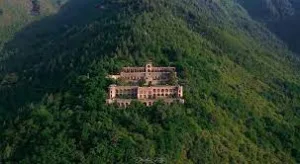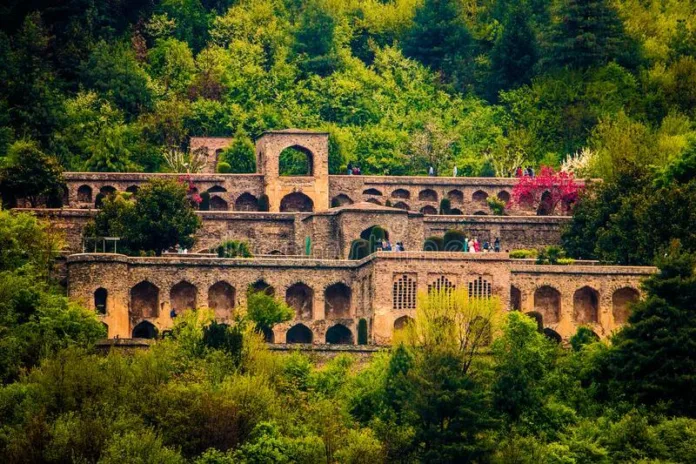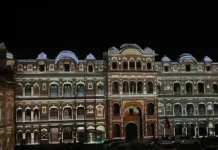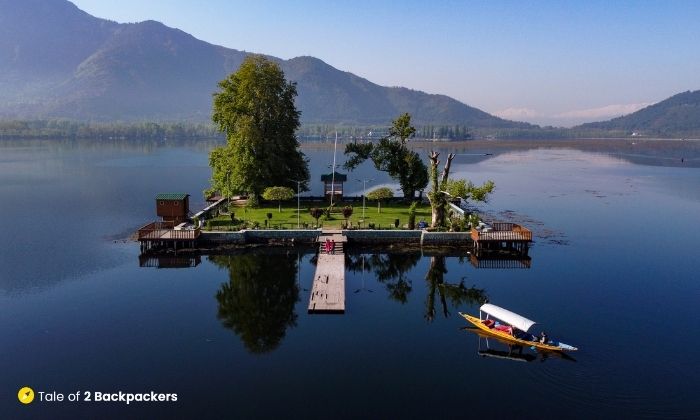Srinagar’s ‘PariMahal’ –Abode of Fairies: Mohammad Hanief
Mohammad Hanief/ October 4,2023
Nestled in the Zabarwan Mountain, PariMahal is amongst the top tourist places to visit in Srinagar. Once the resident of DaraShikoh, the Mughal Prince in 1600s, PariMahal or the Abode of Fairies is adorned with a seven-terraced garden that has a variety of flowering plants, trees, and shrubs for the visitors to see.
The palace was built to be used as a residence and a library for DaraShikoh was further used as an observatory to teach astronomy and astrology. DaraSikoh is said to have dedicated this garden to his Sufi teacher, Mullah Shah. PariMahal is believed to have been constructed in the 1600s. DaraShikoh is said to have lived in this place in the years 1640, 1645, and 1654.
PariMahal is a seven-terraced garden located above the beautiful ChashmeShahi Gardens near Srinagar. In the night, the entire mahal gleams with light and its reflection can be seen on Dal Lake. Also called the abode of fairies or the home of angels, the historical monument sits on top of the Zabarwan range overlooking Srinagar and the Dal Lake. The main attraction is the numerous colourful flowers and exotic fruit plantations.
PariMahal was built by DaraShikoh, the eldest son of the Mughal Emperor Shah Jahan. It is believed that the mahal was once a Buddhist monastery. Later on, it served as a school of astrology for Prince DaraShikoh. The architecture of PariMahal is traditional Islamic type of architecture while the surrounding gardens are exceptionally well maintained.
The monument in the garden is an example of art and architecture during the reign of Shah Jahan, the Mughal Emperor. The structure is surrounded by the alluring garden. It was also used as an observatory for teaching astronomy and astrology. This place was initially planned as a retreat for Sufi teachers.
Overlooking the Dal Lake and sitting pretty above the Zabarwan mountain range, PariMahal, which translates to ‘the palace of fairies’ offers some of the most stunning views in all of Srinagar. Gaze at the undulating hills and glittering waters in the distance and the monument will certainly seem to live up to its moniker. At first glance, one would think that the palace was built straight out of a fairy tale. But as per local legends, PariMahal was named not for its heavenly location but for its mythical sightings and lore of princesses who were kept there against their will by evil magicians.

PariMahal’s entire structure pays homage to the art during the time of Shah Jahan’s reign, with signature elements of Islamic architecture— its exquisite arches and terraced gardens set it apart from other Kashmiri monuments.
The prince lived there in the years 1640, 1645 and 1654 respectively, during which PariMahal is believed to have served as his library, spiritual centre and dwelling place. Due to its height and unique location, the structure was then also used as an observatory to teach astronomy and astrology.
The structural remains and the garden of PariMahal provide a perfect fusion of buildings and gardens.The monument is divided into six terraces. The garden in PariMahal is different from other Mughal gardens of Kashmir. It is devoid of any waterfall, water chutes, cascades and the layout of canals, which used to be the general characteristic features of other building complexes found in the valley. There are ornamental fountain and lakes in five terraces. The terracotta pipes have been used for collecting water into tanks on various terraces.
The topmost terraces had a reservoir and a pavilion. The pavilion was built of local rubble stones. The two small arches have been provided to its facade. A reservoir is connected to the terrace which finally connected to a canal with the help of earthen pipes.
The gushing canal fed by a spring which is about half kilometre away in the hills. Each terrace is connected with the lower one by a few steps on the corner to descend down. The facade of the retaining wall of the first terrace is adorned with arcade to beautify its front elevation. It is provided with a series of Manteca recessed arch.
There are two more arches on either side of the stairs each of them is surmounted by a niche. The second terrace is connected with the first by stairs. In the middle of former is a rectangular tank which receives water from the first terrace through water chute. The third terrace is elegant and distinctive part of the garden. It can easily be approached through a brick arch gate on the east.
There are royal residential quarters along the gate. A hammam is situated in the north of the royal residential quarters. It is connected with a room said to be designed for heating water with the help of earthen pipes to provide hot water in winter or cold weather. On the southern and western half of retaining walls there are similar rooms or chambers.
The retaining wall of south side has a pavilion. The water flows down into the tank of the next terrace through the earthen pipe. The water flowing into the canals in this terrace presents a picturesque scene. These three higher terraces were meant for the royal use. The remains of earthen pipes and a tank beyond the retaining wall are visible on the fourth terrace.
The next terrace like other terraces has a pavilion and a tank whole upper portion of the wall is provided with perforated square holes. The retaining wall of the pavilion has a double row of arches. The opinion of certain scholars that the perforated square holes were made for the use of pigeons is quite unique. It may be a peculiar feature of the monument for beautification. In the last terrace of PariMahala water tank is in the middle which is usually fed through earthen pipes. Finally the waterfalls in Dal Lake. The entire building is enclosed with massive walls. On the ends of the each walls octagonal bastion are located to support and beautify the structure.
The main attraction of the place is the view which it offers. PariMahal provides a great view of the Chinar trees in the surrounding area and the Dal Lake. The attraction can be visited all around the year. However, the best time to visit the place is from April to October when the weather remains pleasant.
Srinagar city in the Kashmir valley is renowned for its fantastic gardens and lakes. These beautiful Gardens of Srinagar have picturesque hill slides, flowering shrubs and trees, and gorgeous water bodies. Despite witnessing centuries of change, the gardens still manage to lure tourists from all over the world.
Many gardens are the creations of the great Mughals, while some were built by modern-day authorities. Truly captivating and delightful, the renowned gardens boast exquisitely carved lawns, a massive spectrum of colorful flowers, and stepped terraces.

NOTE: The views expressed are personal .The author is a regular columnist and can be mailed at [email protected])














